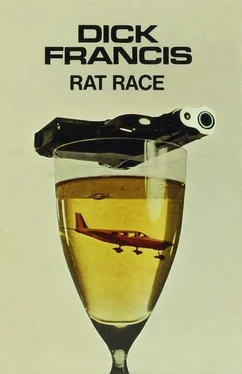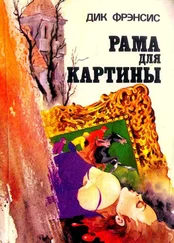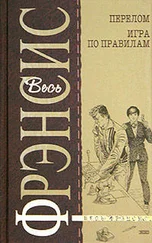That was after they had recovered, of course. When I reached them at a run near the airport doors their eyes were stretched wide and their faces were stiff with shock. Annie Villars mouth had dropped open and she was shaking from head to foot. I put my hand on her arm. She looked at me blankly and then made a small mewing sound and crumpled against me in a thoroughly un-Napoleonic faint. I caught her on the way down and lifted her up in my arms to save her falling on the shower soaked tarmac. She weighed even less than she looked.
‘God,’ said Goldenberg automatically. ‘God.’ His mind and tongue seemed to be stuck on the single word.
The Major’s mouth was trembling and he was losing the battle to keep it still with his teeth. Sweat stood out in fine drops on his forehead and he was breathing in short shocked gasps.
Holding Annie Villars I stood beside them and watched the death throes of the aeroplane. The first explosion had blown it apart and almost immediately the fuel tanks had ignited and finished the job. The wreckage lay strewn in burning twisted pieces over a radius of wet tarmac, the parts looking too small ever to have formed the whole. Rivers of burning petrol ran among them, and great curling orange and yellow flames roared round the largest piece, which looked like the front part of the cabin.
My seat. My hot, hot seat.
Trouble followed me around like the rats of Hamlin.
Colin Ross looked as shocked as the others but his nerves were of sterner stuff. ‘Was that... a bomb?’
‘Nothing but,’ I said flippantly.
He looked at me sharply. ‘It’s not funny.’
‘It’s not tragic, either,’ I said. ‘We’re still here.’
A lot of the stiffness left his face and body. The beginnings of a smile appeared. ‘So we are,’ he said.
Someone in the control tower had pressed the panic button. Fire engines screamed up and foam poured out of the giant hoses onto the pathetic scraps. The equipment was designed to deal with jumbos. It took about ten seconds to reduce the Cherokee sized flames to black memories.
Three or four airport cars buzzed around like gnats and one filled with agitated officials dashed in our direction.
‘Are you the people who came in that aircraft?’
The first of the questions. By no means the last. I knew what I was in for. I had been taken apart before.
‘Which is the pilot? Will you come with us, then, and your passengers can go to the manager’s office... Is the lady injured?’
‘Fainted,’ I said.
‘Oh...’ he hesitated. ‘Can someone else take her?’ He looked at the others. Goldenberg, large and flabby; the Major, elderly; Colin, frail. His eyes passed over Colin and then went back, widening, the incredulity fighting against recognition.
‘Excuse me... are you...?’
‘Ross,’ said Colin flatly. ‘Yes.’
They rolled, out the fed carpet, after that. They produced smelling salts and a ground hostess for Annie Villars, stiff brandies for the Major and Goldenberg, autograph books for Colin Ross. The manager himself took charge of them. And someone excitedly rang up the national press.
The Board of Trade investigators were friendly and polite. As usual. And persistent, scrupulous, and ruthless. As usual.
‘Why did you land at East Midlands?’
Friction.
‘Had you any idea there was a bomb on board?’
No.
‘Had you made a thorough pre-flight investigation?’
Yes.
‘And no bomb?’
No.
Did I know that I was nevertheless responsible for the safety of the aircraft and could technically be held responsible for having initiated a flight with a bomb on board?
Yes.
We looked at each other. It was an odd rule. Very few people who took off with a bomb on board lived to be held responsible. The Board of Trade smiled, to show they knew it was silly to think anyone would take off with a bomb, knowing it was there.
‘Did you lock the aircraft whenever you left it?’
I did.
‘And did it remain locked?’
The knife was in. I told them about the Major. They already knew.
‘He says he is sure that he relocked the doors,’ they said, ‘But even so wasn’t it your responsibility to look after the safety of the aircraft, not his?’
Quite so.
‘Wouldn’t it have been prudent of you to accompany him to fetch the paper?’
No comment.
‘The safety of the aircraft is the responsibility of the captain.’
Whichever way you turned, it came back to that.
This was my second interview with the Board of Trade. The first, the day after the explosion, had been friendly and sympathetic, a fact-finding mission during which the word responsibility had not cropped up once. It had hovered delicately in the wings. Inevitably it would be brought on later and pinned to someone’s chest.
‘During the past three days we have interviewed all your passengers, and none of them has any idea who would have wanted to kill them, or why. We now feel we must go more carefully into the matter of opportunity, so we do hope you don’t mind answering what may be a lot of questions. Then we can piece together a statement for you, and we would be glad if you would sign it...’
‘Do all I can,’ I said. Dig my own grave. Again.
‘They all agreed that the bomb must have been in the gift wrapped parcel which you yourself carried on board.’
Nice.
‘And that the intended victim was Colin Ross.’
I sucked my teeth.
‘You don’t think so?’
‘I honestly have no idea who it was intended for,’ I said. ‘But I don’t think the bomb was in the parcel.’
‘Why not?’
‘His sister bought it, that morning.’
‘We know.’ He was a tall man, with inward looking eyes as if they were consulting a computer in his head, feeding in every answer he was given and waiting for the circuits to click out a conclusion. There was no aggression anywhere in his manner, no vengeance in his motivation. A fact finder, a cause-seeker: like a truffle hound. He knew the scent of truth. Nothing would entice him away.
‘And it sat on a shelf in the changing room all afternoon,’ I said. ‘And no one is allowed into the changing room except jockeys and valets.’
‘We understand that that is so.’ He smiled. ‘Could the parcel have been the bomb? Weightwise?’
‘I suppose so.’
‘Miss Nancy Ross says it contained a large fancy bottle of bath oil.’
‘No pieces in the wreckage?’ I asked.
‘Not a thing.’ The tall man’s nose wrinkled. ‘I’ve seldom seen a more thorough disintegration.’
We were sitting in what was called the crew room in the Derrydown office on the old R.A.F. airfield near Buckingham. Such money as Derrydown spent on appearances began in the manager’s office and ended in the passengers’ waiting lounge across the hall. The crew room looked as if the paint and the walls were coming up to their silver wedding. The linoleum had long passed the age of consent. Three of the four cheap armchairs looked as if they had still to reach puberty but the springs in the fourth were so badly broken that it was more comfortable to sit on the floor.
Much of the wall space was taken up by maps and weather charts and various Notices to Airmen, several of them out of date. There was a duty roster upon which my name appeared with the utmost regularity and a notice typed in red capitals to the effect that anyone who failed to take the aircraft’s documents with him on a charter flight would get the sack. I had duly taken all the Cherokee’s records and maintenance certificates with me, as the Air Navigation Order insisted. Now they were burned to a crisp. I hoped someone somewhere saw some sense in it.
The tall man looked carefully round the dingy room. The other, shorter, broader, silent, sat with his green bitten HB poised over his spiral bound notebook.
Читать дальше




